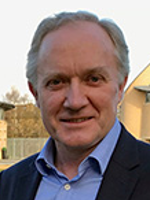
Career
- 2009-date: Director of Centre for Theoretical Cosmology, University of Cambridge
- 2009-date: Project Leader (Cosmic Defects and Non-Gaussianity) for ESA Planck Satellite project
- 2008-date: Professor of Cosmology, University of Cambridge
- 1997-date: Coordinator, COSMOS, the UK National Cosmology Supercomputer
- 1995-2008: Lecturer, Senior Lecturer (2001) and Reader (2003) in Cosmology, University of Cambridge
- 1991-1996: PPARC Advanced Research Fellowship, University of Cambridge
- 1987-1989: Postdoctoral Fellowship, Center for Theoretical Physics, MIT
- 1985-1987, 1989-1991: Research Fellow, Trinity College, University of Cambridge
- 1983-1986: PhD in Quantum Effects in the Early Universe, University of Cambridge. Supervisor: Professor Stephen W. Hawking
Research
I am a member of the Department of Applied Mathematics and Theoretical Physics (DAMTP). My research endeavours to advance the confrontation between theories of the early universe and empirical cosmology, focusing especially on the primordial fluctuations for large-scale structure formation. Ongoing investigations of the science that can be extracted from the cosmic microwave sky includes work on critical tests to distinguish between inflationary models or even to identify the distinct signatures of cosmic defects. I lead a nongaussianity project within the Planck Surveyor satellite consortium. I have a longstanding interest in phase transitions in the early universe which can form cosmic strings or other cosmological defects. Among their dramatic observational consequences which I study are the origin of dark matter axions, the existence of stable superconducting string loops (vortons) associated with high energy cosmic rays or other phenomena, and primordial backgrounds of gravitational waves which may lie within the range of the forthcoming generation of detectors.
Since its inception in 1997, I have been coordinating COSMOS, the UK National Cosmology Supercomputer, an essential tool for quantitative progress in theoretical cosmology.
Selected Publications
- Avgoustidis, A. and Shellard, E.P.S., Velocity-Dependent Models for Non-Abelian/Entangled String Networks, Phys. Rev. D78, 103510 (2008) [arXiv: 0705.3395].
- Fergusson, J.R. and Shellard, E.P.S., The shape of primordial non-Gaussianity and the CMB bispectrum, Phys. Rev. D80, 043510 (2007) [arXiv: 0812.3413].
- Shellard, E.P.S., The future of cosmology: observational and computational prospects, in The Future of Theoretical Physics and Cosmology (Stephen Hawking 60th Birthday Festschrift volume), G.W. Gibbons, E.P.S. Shellard, S.J. Rankin (eds.) (CUP, 2003).
- Amery, G., E.P.S. Shellard, Causal perturbation theory in general FRW cosmologies I: Energy-momentum conservation and matching conditions, Physical Review D (2002) [astro-ph/0207146].
Publications
- <
- 19 of 21
